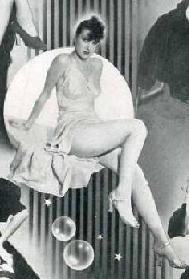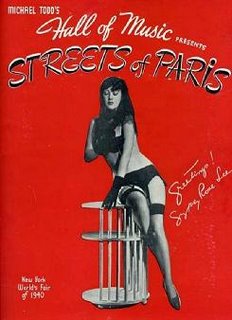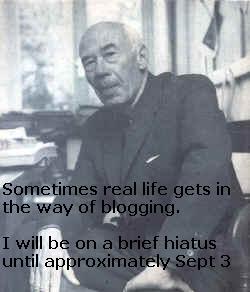Saturday, August 19, 2006
Sunday, August 06, 2006
Miller On The Future Of Communication
 "You know, I'm sorry I didn't know about this recording business earlier. (cough) It's a new medium for me and I realize I've been rather awkward and self-conscious [...] One thing I realize: every medium has its own laws. And you've got to respect those laws. I don't think that one really ought to read from his own writing. One oughtta stand up and create, on the wing as it were" [Henry Miller during a monologue recording session, 1949]
"You know, I'm sorry I didn't know about this recording business earlier. (cough) It's a new medium for me and I realize I've been rather awkward and self-conscious [...] One thing I realize: every medium has its own laws. And you've got to respect those laws. I don't think that one really ought to read from his own writing. One oughtta stand up and create, on the wing as it were" [Henry Miller during a monologue recording session, 1949]As posted earlier (Henry Miller Cuts a Record), Miller was recorded to disk while reading his work in 1949. After reading a excerpt from The Colossus Of Maroussi called New York, Miller then went on to speak freely for ten minutes about the recording session and about the future of the written word and creative human communication.
Much of this ad-lib has recently been (roughly) transcribed on a blog called Drip And Spew(thanks for the inspiration to make my own post). You can listen to Miller's speech on Ubuweb's Henry Miller page: just click on New York and forward it to timecode 11:37.
THE MONOTONY OF ONE'S OWN VOICE
MICROPHONE ANXIETY
At 13:51, Miller talks about the psychological factors involved in speaking into a microphone: "you have the feeling that there are millions of ears out there" and this creates an anxious physical response. He goes on to compare the act of writing to the "direct contact" of speech, which creates a danger of "failure" if it doesn't immediately "register" with its audience.
"Don't do it over the microphone! Do it at home. Do it alone. Do it on the typewriter, but don't try and speak it, because you'll only become a sort of ham actor. You're only echoing yourself and it's a paradoy and a travesty." [15:30]
THE IMPERSONAL CONTRAPTIONS
Miller speaks about a paradox in the fact that the recording medium is impersonal yet personal. He goes on an amusing little technophobic rant about creepy "contraptions" and "aparatus" ("his ears are all plugged up!") and how one must "get clear of that maze" of wires in order to believe that what he's saying is registering with the audience.
Henry then clues in that this is similar to the leap of faith the writer must take when he writes in isolation. Still, he talks about words as if one's creativity with them is only increased through the act of writing ("you can paint with them, you can use them musically"); it's all very ironic, considering that people used to encourage Henry to write the way that he spoke.
THE POSSIBLE USES OF BLOODY MACHINES
"This damn thing has it's own laws and I'm only beginning to get it now." [17:50] Henry gradually considers the potential of the medium, suggesting that speeches could be written specifically for it [an anachronistic idea, really, considering the 20 years of radio that preceeded this rant]. He also likes the idea of recording great conversations with friends and adversaries on "this bloody machine" in order to be able to refer to them.
At 21:20, he talks about the two types of men he enjoys most: The Pantomimist (i.e. clowns) and The Talker (especially burlesque comedians and Danny Kaye).
THE FUTURE OF THE WRITTEN WORD
"This whole experiment has gotten me to thinking and believing more strongly than ever that we're not going to be reading books very many more years. It wouldn't surprise me that in another 50 years there won't be any more books. We'll have this direct communication with one another. We might not even have to talk into a microphone then. We might not need records or tape or anything. We might have that wonderful thing happen, like a miracle, and I can see it happening, that when a man feels like creating he'll just create and maybe he won't even open his mouth. But it will register. And it will register on everyone and it won't be exclusive. You won't have to buy a book or join a club or any of that sort of thing. The real spontaneous, creative act will be communicated universally, simultanously, instantaneously. That would be a wonderful thing. [22:00]
TODAY I SEE A MILLION USELESS WORDS
"And now we're in a sort of intermidiate stage. We're breaking away from that cold dead print which is full of phony stuff." Quite a turnaround of thought here, but that's Miller for you. " I've written a lot of words--millions of words I guess--and I think today more than ever in my whole life I realize how uselsss and unnecessary were a lot of those words. Certainly when I repeat them [in a recital] I see that they don't belong. They weren't necessary." [23:10]
He then goes on to champion the men who can charm and "hypnotize" through the direct use of language, by voice. Far above the modern text writers, Miller places high on a pedestal the ancient storytellers like Homer: "those wizards who had the verbal faculty. Let's get back to that, that's what I say."
"OK Louie, that's all."
Now that's what I call a 360-degree reversal.
Thursday, August 03, 2006
Miller And Gypsy Rose Lee
 One of the most famous burlesque dancers of all time is Gypsy Rose Lee (1911 or 1914 -1970). On at least two occassions, Henry Miller had the opportunity to see her perform.
One of the most famous burlesque dancers of all time is Gypsy Rose Lee (1911 or 1914 -1970). On at least two occassions, Henry Miller had the opportunity to see her perform.In 1935, Miller reported in his long letter to Alfred Perles--published as Aller Retour New York--that he had just seen Gypsy Rose Lee in New York:

"At the burlesk Sunday afternoon I heard Gypsy Rose Lee sing 'Give Me A Lay!' She had a Hawaiian lei in her hand and she was telling how it felt to get a good lay, how even mother would be grateful for a lay once in a while. She said she'd take a lay on the piano, or on the floor. An old-fashioned lay, too, if needs be. The funny part of it is the house was almost empty." [Aller, p. 3].
Miller then goes on to describe the activites of the men and the dancers in such a strip club, though mention of Ms Lee ends here. It's a shame that I can't find the lyrics to Give Me A Lay on the internet.
At the time that Miller had seen Gypsy early in 1935, she was 23 years old, although her actual birth date seems contested (half of the sources I found list 1911 and half 1914; the latter would mean she started stripping at age 17). Over the course of a few years, she made a name for herself in the striptease business. Her home base in New York was Minsky's Burlesque, where Miller likely saw her for his account in Aller Retour. Later that year, Gypsy Rose went out to Hollywood to take a crack at big time celebrity.
 Several years later, in 1940, Henry encountered Gypsy Rose before his cross-America tour that was to become The Air-Conditioned Nightmare. In his Nightmare Notebook, in which he kept notes of his journey, he made a brief reference to Ms Lee:
Several years later, in 1940, Henry encountered Gypsy Rose before his cross-America tour that was to become The Air-Conditioned Nightmare. In his Nightmare Notebook, in which he kept notes of his journey, he made a brief reference to Ms Lee:"Gypsy Rose Lee (burlesque queen) saying to me at World's Fair, N.Y. on eve of trip: 'I could think of a lot better things to do than tour America.' Elle avait raison, la petite! Dont de meme, j'ai vu quelque chose. J'ai fait quelques decouvertes." [Nightmare Notebook, no page number].
The N.Y. World's Fair closed on October 27, 1940; Miller left for his road trip on October 20th [ref.] or October 24th [ref.]. He obviously decided to catch the fair in the final days; in particular, the Streets Of Paris show in which Gypsy Rose Lee was performing. Within a year of meeting Miller, Lee hired a writer to ghost-write a mystery novel under her name called The G-String Murders. I wonder if she ever offered the gig to Henry?
Read more about Henry's earliest burlesque experiences, in this posting.

